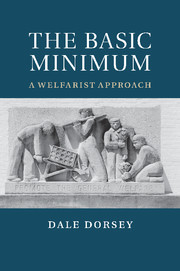6 - On objections to welfarism
Published online by Cambridge University Press: 05 March 2012
Summary
My approach to the basic minimum is now fully on the table. I have argued in favor of WBM (of the claim that the basic minimum is the achievement of a valued project) against non-welfarist conceptions of the basic minimum. I argue that Lexical and Prioritarianesque properly characterize the comparative intrinsic value of the basic minimum against non-minimum states, and that when combined with The Teleological View provide a thorough (and, I humbly submit, attractive) solution to the problem of weight.
However, I recognize that the reader may have grown impatient. After all, there are a number of well-known (and well-worn) objections to welfarism I have not yet discussed. The time has come to reckon with them. The final chapter of this book thus responds to a number of classic (and not-so-classic) objections to a welfarist approach to the basic minimum, or, indeed, to morality (especially political morality) in general. There are six objections to be discussed.
The first – in §6.1 – notes two problems for welfarist approaches to political morality: the problems of expensive and offensive tastes. In §6.2, I consider an objection that might motivate a return to the capabilities approach: the objection from imprudent choices. Incidentally, my response to the objection from imprudent choices will help motivate a further response to some forms of the objection from expensive and offensive tastes. In §6.3, I address an objection to a welfarist view on grounds of respect for persons.
Information
- Type
- Chapter
- Information
- The Basic MinimumA Welfarist Approach, pp. 176 - 208Publisher: Cambridge University PressPrint publication year: 2012
